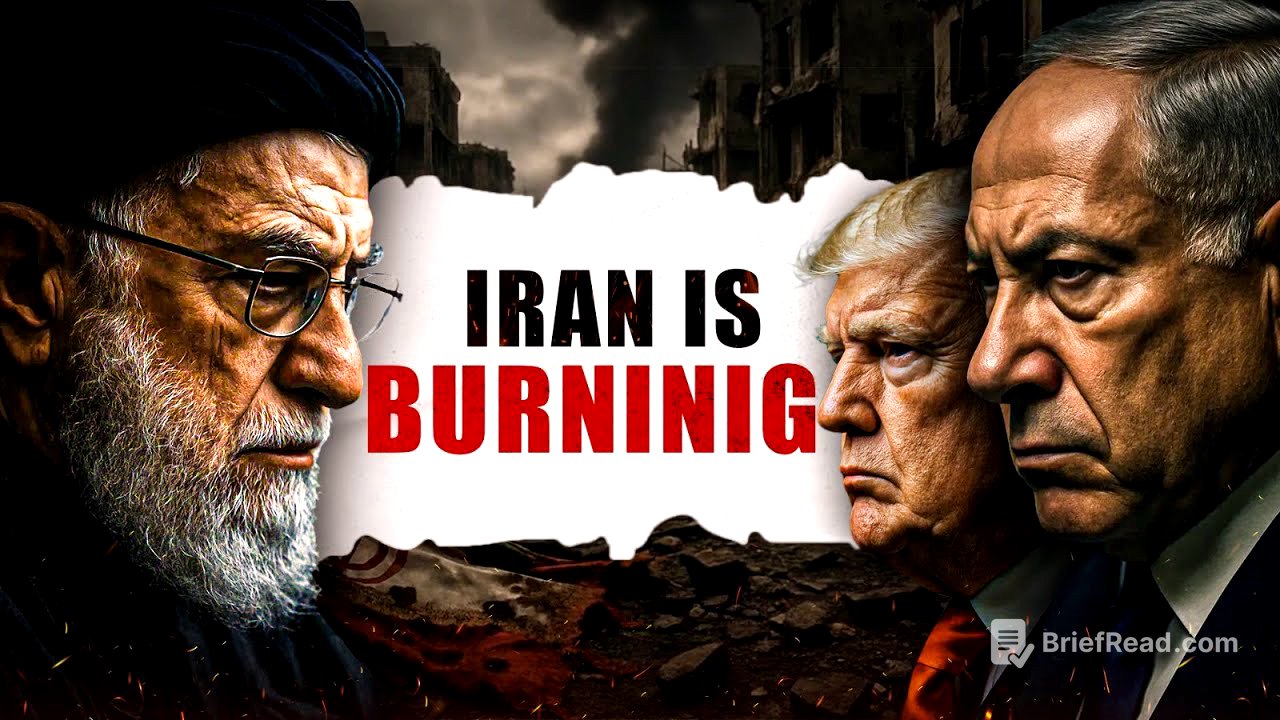TLDR;
The video discusses the escalating conflict between Iran and Israel, focusing on Iran's nuclear program and the potential consequences for global stability. It highlights Israel's concerns over Iran's nuclear ambitions, the strategic importance of the Strait of Hormuz, and the potential for a nuclear arms race in the Middle East. The video also touches on the involvement of other countries like America and the potential for a larger global conflict.
- Iran and Israel conflict is escalating.
- Iran is close to making a nuclear bomb, alarming Israel and America.
- The Strait of Hormuz is critical for global oil trade, and Iran's control could destabilize the world economy.
- A nuclear Iran could trigger a nuclear arms race in the Middle East.
Iran and Israel Conflict Intensifies [0:13]
The conflict between Iran and Israel has escalated, marked by attacks and counter-attacks. Israel has reportedly destroyed a significant portion of Iran's long-range missile launchers and killed military commanders and scientists. Iran has reported civilian deaths following unprecedented attacks by Israel, with visuals showing explosions over Israeli skies targeting Iranian nuclear sites. The situation is becoming increasingly dangerous, with America issuing warnings to Iran.
The Imminent Threat of a Nuclear Iran [3:41]
The International Atomic Energy Agency reported in May 2025 that Iran possesses 60% enriched uranium, raising concerns about its nuclear ambitions. Uranium enrichment involves separating U235 atoms, used for nuclear bombs, from natural uranium. Weapons-grade uranium requires over 90% enrichment, and Iran's progress beyond 60% has triggered global alarm. Historically, America and Israel have acted to prevent countries from developing nuclear weapons, as seen in their actions against Iraq in 1981 and Syria in 2007.
Why Iran's Nuclear Program is a Global Concern [6:39]
Iran's nuclear program is particularly concerning because of its potential to destabilize the global economy. The Supreme Leader of Iran has expressed hostility towards Israel, suggesting a willingness to use nuclear weapons offensively. Iran's ballistic missiles can reach Israel in just 8 minutes, and the country already supports various militant groups in the region. This aggressive stance, combined with nuclear capabilities, poses a significant threat.
The Strategic Importance of the Strait of Hormuz [8:12]
The Strait of Hormuz is a critical sea passage for global oil trade, with 20% of the world's crude oil passing through it daily. If Iran were to block this route, the global oil supply would be disrupted, leading to skyrocketing prices, inflation, and a potential global recession. A nuclear Iran would have significant control over the Strait of Hormuz, limiting America's ability to intervene.
The Potential for a Nuclear Arms Race in the Middle East [9:39]
If Iran develops a nuclear bomb, it could trigger a nuclear arms race in the Middle East, with countries like Saudi Arabia and the UAE seeking their own nuclear weapons. The region is already divided, with Iran supporting rebel groups in Lebanon, Syria, and Iraq, while Saudi Arabia, the UAE, and Egypt align with America. A nuclear Iran would greatly increase the risk of nuclear war in the Middle East.
Possible Outcomes and the Hope for Peace [10:59]
The situation could unfold in several ways: Israel and America might jointly stop Iran's nuclear program, Iran could become a nuclear power and trigger a regional arms race, or Iran and Israel could engage in a war with global implications. The hope is that the conflict ends quickly, as war is a dangerous game best avoided.









